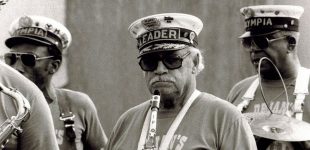Alvin “Red” Tyler
1925 – 1998
1925 – 1998
Saxophonist, band leader, and arranger Alvin Red Tyler is one of the great unsung New Orelans musicians. Even if listeners don’t know his name, they know his work as he was a member of J&M studio band that recorded at Cosimo Matassa’s studio in the 1950s and 1960s, playing on most of the million selling hits that came out of that famed room. Later he was an integral part of starting the first African-American collectively owned record label in the early 1960s. After taking some time off, he became well-known for his jazz work with his band and backing up singer Germaine Bazzle.
Alvin “Red” Tyler was born December 5th, 1925 in New Orleans. In an interview in 1997, he said, “I went to dances and listened at the music, but I didn’t start playing music until I got out of the service. I went into the army, and when I got out on the G.I. Bill of Rights, I went to the Grunewald School of Music. I was a man when I started playing.” According to Tyler’s chapter in Jeff Hannusch’s book The Soul Of New Orleans, Tyler joined the most popular band in town, the Dave Bartholomew Orchestra, in 1949. Soon after that, Bartholomew was hired as the talent scout and producer for Imperial Records. Bartholomew used several members of his band including Tyler and drummer Earl Palmer. They were joined by saxophonists Lee Allen and Herbert Hardesty, guitarists Justin Adams and Ernest McLean, bassist Frank Fields, and pianists Ed Frank and Salvador Doucette. This became the famous J & M Studio Band. As a part of this band, Tyler played on almost all of the hits that came out of New Orleans. His baritone saxophone and occasional tenor could be heard on hits from Fats Domino, Little Richard, Roy Montrell, Huey Piano Smith, Earl King, Guitar Slim, Tommy Ridgley, and many others. He was a mainstay of the band that defined what rock ‘n’ roll has sounded like to this very day. Not only did Tyler play on the sessions, but often he was the de facto arranger and producer. In the studio, Tyler often came up with the “head” arrangements on the spot. Tyler recalled, “We’d all hang out together, and there would be a certain kind of groove that we could lock into, all of us. That’s what made it so easy for us to go into the studio. We could go in, and we’d all know what the concept was, what it was supposed to be.” His influence as being a part of this band is immeasurable. One of the reasons that rock and roll and rhythm and blues sounds the way it did then and does now is because of the way that Tyler played and arranged it.
In the 1960s, Tyler continued playing sessions and even recording an album of well-received instrumentals that included “Peanut Vendor,” “Dippy,” and “Double Whammy.” He also was one of the main instigators of Harold Battiste’s AFO (All For One) Records, the first African-American musician-owned record label. Tyler both recorded for the label as a part of the AFO Executives and worked on the business end. When AFO dissolved in the late 1960s, he played music in Los Angeles for Sam Cooke among others, and then came back to New Orleans where he became a part owner of Parlo Records which recorded Aaron Neville’s “Tell It Like It Is.”
By the 1970s Tyler stopped playing music full time and took a job as a liquor distributor. This allowed his family more stability and him to be more judicious in choosing gigs. He played places like Mason’s Las Vegas Strip, Lu and Charlie’s, the Maple Leaf Bar, and Tyler’s. His bandmates included Clyde Kerr Jr., Germaine Bazzle, David Torkanowsky, James Singleton, Johnny Vidacovich. His impeccable playing could be heard on recordings by Johnny Adams and Gatemouth Brown. While recording James Booker’s Classified, producer Scott Billington heard him play jazz and signed him to Rounder Records. He recorded two excellent straight-ahead jazz albums for them, Graciously and Heritage. He also toured with Dr. John. In recognition of his priceless and invaluable contributions to New Orleans music, the City of New Orleans honored him by declaring July 9, 1997 “Alvin ‘Red’ Tyler Day.”
Tyler passed away on April 3, 1998. He is a true hero of New Orleans music whose playing defined the Crescent City sound for 5 decades.

The saxophone (also referred to as the sax) is a conical-bore woodwind musical instrument. Saxophones are usually made of brass…